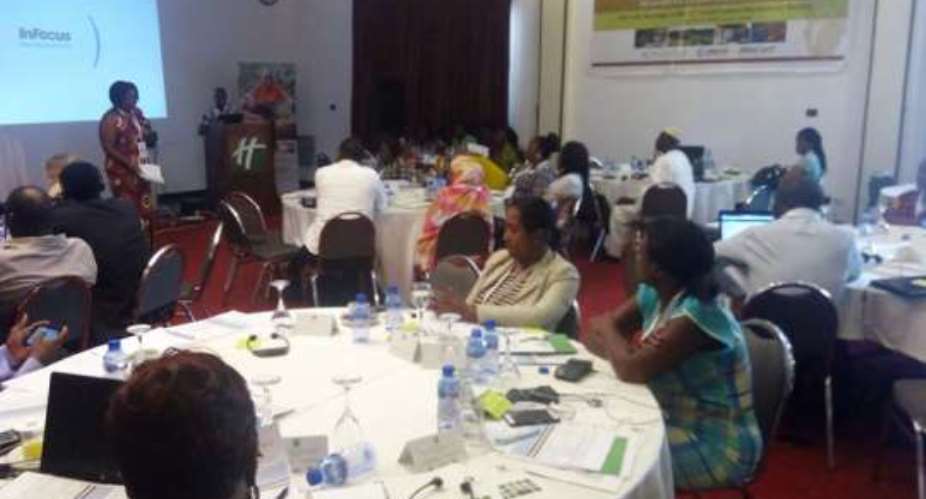By D.I. Laary and Alimatu Quaye
Accra, April 13, GNA - Non-state actors from Africa have met in Accra, to renew their partnership commitments towards assisting governments develop inclusive agricultural policies and design programmes for food security and fight malnutrition.
Members of the Comprehensive African Agricultural Development Programme (CAADP) Non-State Actors' Coalition (CNC) met to reflect on ways of building union members' capacity to help governments come out with comprehensive policies to improve agriculture.
They are also working towards the speedy implementation of the Malabo Declaration adopted in 2014 in Malabo, Equatorial Guinea, to accelerate agricultural growth and transformation to improve wealth and livelihoods.
The meeting, organised with the support from Feed Future, USAID and Africa Lead, had participants from Ghana, Tanzania, Kenya, Uganda, Senegal and Nigeria deliberating on a wide range of issues, including approaches to practicalising the Malabo Declaration.
African leaders converged at an AU summit in Malabo, Equatorial Guinean in 2014 and approved a declaration on accelerated agricultural growth and transformation for shared prosperity and improved livelihoods dubbed 'Malabo Declaration.'
The declaration implementation strategy and roadmap systematically outlines a range of priority actions to be carried out in realising the 2025 CAADP vision - creating a prosperous Africa where wealth is shared among citizens through agricultural transformation.
The meeting held discussions such as funding African agricultural investment to attain Malabo commitments, agricultural finance landscape and policy environment, inclusive access to finance to empower women and youth, innovative delivery of financial services, value chain finance and renewing partnership for accelerated development.
Mr Kop'ep Dabugat, Coordinator CNC told journalists the CAADP was adopted in 2003 as a flagship programme to solve African challenges that could drive growth and prosperity to end hunger and fight poverty using the agricultural sector as the game-changer.
African governments had agreed in the Malabo declaration to allocate 10 per cent of their annual budget to support agriculture, but the coordinator said only about seven countries met the target.
He said transforming the sector is the only way Africa could meet the annual growth rate target of six per cent to drive their economies and to enhance living conditions of the people.
'Agricultural improvement is the way forward for Africa because our economies are more agrarian, so we need to improve production to become self-sufficient, improve marketing, packaging and have better food,' he said.
The Malabo framework aims at ending hunger, lessening poverty, cutting down post-harvest loses, slashing stunted growth, encouraging youth and women to engage agribusiness and finding ways to help governments develop and diversify growth in agriculture production.
'We want to raise issues around it, to crystalise plans and define our coalition as a whole. This year, we will come out with a concrete statement that tells our commitment, actions and recommendations for improvement in CAADP plan,' Dabugat said.
Mouhamet Lamie Ndiaye, Association for Cooperative Operations Research and Development Country Director said: 'There is a lot of wastage in the developed countries, there is a lot of food that is being wasted, which means we are now producing more than what we need.
'The problem we have is that we only distribute it to those that have the capital, what we need to do is to fairly distribute the food that we are producing,' he added.
CAADP aims to achieve an agriculture-led socio-economic growth that would create wealth, tackle poverty and reduce hunger.
It recognises that to transform African agriculture, it is imperative to build broad and inclusive coalitions of states.
GNA





 There’s nothing you can do for us; just give us electricity to save our collapsi...
There’s nothing you can do for us; just give us electricity to save our collapsi...
 Ghanaian media failing in watchdog duties — Sulemana Braimah
Ghanaian media failing in watchdog duties — Sulemana Braimah
 On any scale, Mahama can't match Bawumia — NPP Youth Organiser
On any scale, Mahama can't match Bawumia — NPP Youth Organiser
 Never tag me as an NPP pastor; I'm 'pained' the 'Akyem Mafia' are still in charg...
Never tag me as an NPP pastor; I'm 'pained' the 'Akyem Mafia' are still in charg...
 Your refusal to dedicate a project to Atta Mills means you never loved him — Kok...
Your refusal to dedicate a project to Atta Mills means you never loved him — Kok...
 2024 elections: I'm competent, not just a dreamer; vote for me — Alan
2024 elections: I'm competent, not just a dreamer; vote for me — Alan
 2024 elections: Forget NPP, NDC; I've the Holy Spirit backing me and nothing wil...
2024 elections: Forget NPP, NDC; I've the Holy Spirit backing me and nothing wil...
 2024 elections: We've no trust in judiciary; we'll ensure ballots are well secur...
2024 elections: We've no trust in judiciary; we'll ensure ballots are well secur...
 Performance tracker: Fire MCEs, DCEs who document Mahama's projects; they're not...
Performance tracker: Fire MCEs, DCEs who document Mahama's projects; they're not...
 Train crash: Railway ministry shares footage of incident
Train crash: Railway ministry shares footage of incident
